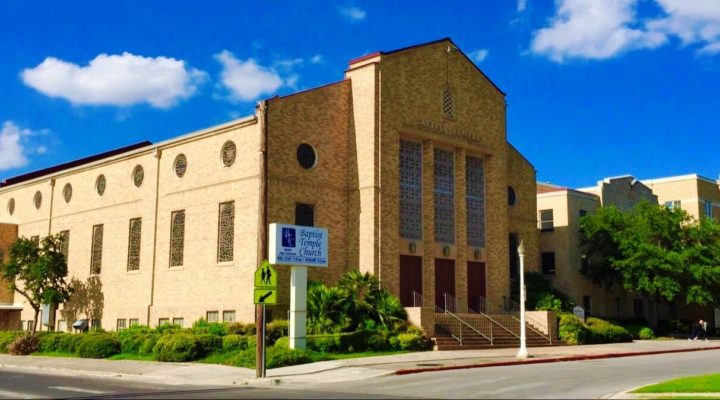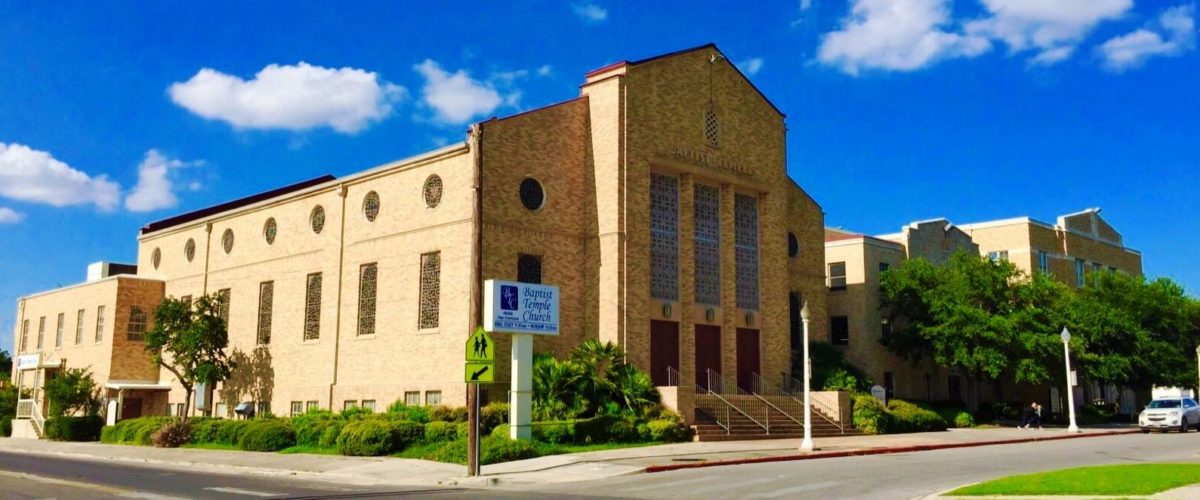A group of Hardin-Simmons University alumni, former faculty and friends have announced plans to launch a freestanding Logdson Theological Seminary in San Antonio, Texas, and they are seeking the blessing of university trustees for their effort.
Those same trustees voted a year ago this week to close Logsdon Seminary as part of Hardin-Simmons, setting off 12 months of bitter dispute with alumni and faculty and donors. The dispute led to formation of a faithful opposition group called Save Hardin-Simmons.
University administrators and trustees cited severe financial constraints as the reason for the seminary’s closure. Alumni and retired faculty claimed the true reason wasn’t financial at all but was instead a capitulation to influential West Texas pastors who thought Logsdon was too liberal in its acceptance of women as ministers and in its lack of hostility to LGBTQ Christians.
Leadership of Save Hardin-Simmons has sought unsuccessfully to obtain detailed financial records from the university that they believe would prove there was no financial crisis. Trustees and university President Eric Bruntmyer have held fast in their position as the seminary wound down operations and faculty lost jobs amid a large-scale strategic plan reset for the university.
Seeking a blessing
On Wednesday, Feb. 10, one of the leaders of Save Hardin-Simmons and a retired dean of Logsdon Seminary each wrote to university trustees asking their blessing for a planned independent seminary to be launched in San Antonio, which is located 250 miles south of Abilene, where Hardin-Simmons is located.
The letters reported that on the same day some alumni and young ministry leaders had met with Bruntmyer and other university administrators and staff in a “cordial” conversation that involved “mutual listening.”
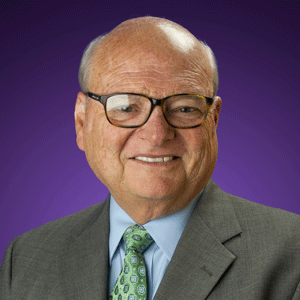
Donald Williford
Both Don Williford, retired Logsdon dean, and Jonathan Davis, vice president of the Logsdon Alumni Council and a leader of Save Hardin-Simmons, praised Bruntmyer for the meeting.
“I applaud President Bruntmyer in his initiative to build relationships with HSU ministry alums and hear feedback from those serving in the field,” Davis wrote.
“I want to acknowledge and express my gratitude to President Bruntmyer for his generous offer to provide personal and institutional support for those who are giving leadership in the process of founding a new seminary in San Antonio,” Williford wrote.
Both Davis and Williford made one request of university trustees — to give their formal blessing to the new seminary.
“Trustees, will you please consider passing a resolution of support from the HSU board of trustees, affirming the effort to form a freestanding Logsdon Theological Seminary in San Antonio?” Davis wrote. “I believe this would serve as a constructive way forward for the entire HSU family, and perhaps bring some sense of closure to all the pain and grief of so many over this past year.”
Williford reminded trustees of a promise Bruntmyer made on Feb. 12, 2020, when the Logsdon closure was announced in a letter to the university.

Eric Bruntmyer
“A group of individuals have begun to consider the possibility of a freestanding seminary separate and apart from Hardin-Simmons University and located in San Antonio,” Bruntmyer wrote one year ago. “If there are institutions, churches and individuals that are interested in taking this path or another path, Hardin-Simmons University stands ready to assist with any consultation and assistance.”
Williford and Davis now asked the trustees to ratify this earlier pledge.
A new Logsdon forming
Williford reported that the “Logsdon family heirs have granted their blessing to use the name ‘Logsdon’” for the new seminary. The original donors to Hardin-Simmons, Charles and Koreen Logsdon, both are deceased. Their initial gift of $5 million in 1982 was the seed that blossomed into a seminary on the Hardin-Simmons campus.
Davis confirmed in an interview with BNG that organizers have filed documents for a nonprofit corporation with the Texas Secretary of State under the name “Logsdon Theological Seminary,” and are in the process of seeking a non-profit determination letter from the IRS.
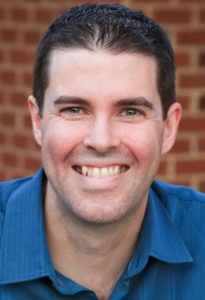
Jonathan Davis
“The leadership of Logsdon Theological Seminary in San Antonio is committed to carrying on the Logsdon family’s dream of graduate-level preparation of Christian ministers and missionaries,” Davis said in his letter to trustees.
For university trustees to bless this enterprise would be “an olive branch within a fractured HSU family,” a “positive way to honor the dream and the ongoing legacy of Charles and Koreen Logsdon” and would “carry great symbolic weight in building bridges among HSU and her many diverse constituents,” Davis suggested.
The changing seminary landscape
News of Logsdon Seminary’s closure gave impetus to at least two other Texas seminaries to advance special programs to appeal to Baptist students. Abilene Christian University — affiliated with the Churches of Christ — began a Baptist Studies Center and hired a Logsdon professor, Myles Werntz, to lead it. Two hundred miles away in Dallas, Perkins Theological Seminary at Southern Methodist University had just one year earlier birthed its Baptist House of Studies and welcomed Logsdon students to transfer there.
Meanwhile, Baylor University’s Truett Theological Seminary announced in May 2020 that it would take over space at Trinity Baptist Church in San Antonio that had been occupied by Logsdon’s San Antonio extension campus. The Truett San Antonio campus is scheduled to open this summer.
That decision was made in light of the known facts at the time to produce the most beneficial outcome, said Leslie Hollon, pastor at Trinity. “In light of our own grieving about the closing of Logsdon Seminary and the need to provide theological education for men and women from diverse cultural backgrounds, we invited Truett Seminary to offer a program here in San Antonio.”
Texas, Virginia and North Carolina have become the epicenter of new seminaries and divinity schools launched since a schism within the Southern Baptist Convention began in 1979 and reached full bloom by 2000. That schism led to creation of the Cooperative Baptist Fellowship in 1992. It also fractured the traditional pipeline for theological education in Texas and surrounding states.
Prior to the SBC fight, Southwestern Baptist Theological Seminary in Fort Worth, Texas, not only was the largest seminary in the world but was the dominant force among Baptists in the South and Southwest. Because it was begun in 1908 out of Baylor University’s religion department, Baylor for the next 80 years did not operate a seminary.
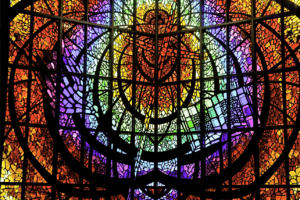
Logsdon Seminary chapel window
That changed in 1991, however, as SBC fundamentalists took complete control of the Southwestern Seminary board, fired the beloved president and began a sharp rightward shift at a seminary already considered to be among the SBC’s most conservative theologically. Centrist and progressive Texas Baptist pastors and denominational leaders were alarmed about the future of the state’s churches and sought an alternative option — turning once again to Baylor. The result was Truett Seminary.
Although Hardin-Simmons began offering seminary classes through its School of Theology in 1995, it did not obtain full seminary accreditation until 2004.
Truett and Logsdon have occupied somewhat different places in the world of non-fundamentalist Texas Baptists. Truett grew to be the larger of the two, but Logsdon gained a reputation for being more explicitly open to women in ministry — although both schools enroll women in all available courses, which Southwestern Seminary does not.
Where will the new Logsdon fit in?
What does that portend for a new Logsdon Seminary to be planted in San Antonio?
For one, the new Logsdon will be housed at Baptist Temple, a historic church on San Antonio’s south side, which is a majority Hispanic community and the opposite side of town from the previous extension campus at Trinity Baptist.
The new Logsdon will be housed at Baptist Temple, a historic church on San Antonio’s south side.
“Pastor Jorge Zayasbazan and his staff are incredibly supportive,” Davis said.
The new Logsdon will seek affiliations and partnerships “with churches across the Southwest,” he said. “Additionally, Logsdon Theological Seminary desires to develop creative ecumenical relationships with a variety of faith groups, while offering theological education firmly rooted in a generous and robust Baptist heritage.”
Organizers chose San Antonio in part because Logsdon Seminary already has a presence there, Davis explained. That means an ability to build on pre-existing relationships with local churches. Also, “San Antonio is a major metropolitan area in South Texas in proximity to the Mexican border, Austin and the Gulf of Mexico. It is often described as a gateway city to South and Central America.”
Davis reported that six seminaries currently operate in the San Antonio metro area that grant graduate-level degrees. “Two of these schools are Roman Catholic, one is fundamentalist and non-denominational, and the other three are Baptist.”
Of all those schools, only two currently offer master of divinity programs accredited by the Association of Theological Schools. Among those is Northern Baptist Theological Seminary, which operates a San Antonio center with interactive live-streaming classes from its Chicago campus. Truett Seminary has not yet announced plans to offer the master of divinity degree at its San Antonio campus.
Within this space, the new Logsdon will make its mark, Davis said, through intentional diversity, a practical focus, a hybrid of online and in-person classes, affordable tuition, a full commitment to training women and men equally for pastoral ministry, and ecumenical partnerships.
“We have significant money pledged from private individuals with plans to raise an additional $4 million in the next 12 months.”
Logsdon will be “the only locally based evangelical Protestant seminary in San Antonio, with professors who live and serve as local theologians and practitioners,” he added.
Leadership of the new enterprise thus far consists of leaders in the Save Hardin-Simmons movement, Davis said. Williford will serve as acting president. Classes will be taught by former Logsdon Seminary faculty and adjuncts, including Logsdon alumni in the area who hold doctoral degrees.
Regarding funding, the challenge of all educational institutions, Davis said: “We have significant money pledged from private individuals with plans to raise an additional $4 million in the next 12 months. We are in the process of developing a robust capital campaign with giving options for donors of any means. We are also exploring grant funding possibilities with a number of foundations.”

